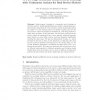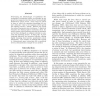46 search results - page 4 / 10 » Discretization of Continuous Action Spaces in Extensive-Form... |
101
Voted
MICAI
2009
Springer
15 years 8 months ago
2009
Springer
Reinforcement Learning is a commonly used technique in robotics, however, traditional algorithms are unable to handle large amounts of data coming from the robot’s sensors, requi...
115
click to vote
AAAI
1996
15 years 3 months ago
1996
Overcoming the disadvantages of equidistant discretization of continuous actions, we introduce an approach that separates time into slices of varying length bordered by certain ev...
125
click to vote
WSC
2000
15 years 3 months ago
2000
Many artificial intelligence techniques rely on the notion ate" as an abstraction of the actual state of the nd an "operator" as an abstraction of the actions that ...
111
click to vote
SIGECOM
2004
ACM
15 years 7 months ago
2004
ACM
We provide efficient algorithms for finding approximate BayesNash equilibria (BNE) in graphical, specifically tree, games of incomplete information. In such games an agent’s p...
133
Voted
JAIR
2008
15 years 1 months ago
2008
It is well-known that acting in an individually rational manner, according to the principles of classical game theory, may lead to sub-optimal solutions in a class of problems nam...


